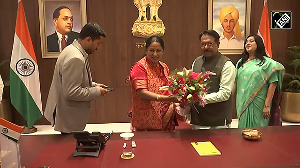The importance of balance in television discussions as the hostage drama continues needs to be emphasised, says strategic expert B Raman
Maoists on August 29 kidnapped Bihar sub-inspectors Rupesh Kumar and Abhay Prasad Yadav, Bihar Military Police havildar Ehtesham Khan and BMP ASI Lucas Tete after an encounter in the Kajra police station area the same day, which left eight cops dead.
They reportedly demanded the release of eight Maoists who are in the custody of the local authorities for being allegedly involved in acts of violence.
Following the apparent absence of any move by the Bihar government to establish contact with them before the deadline indicated by them for talks on their demand expired, they have killed ASI Lucas Tete. They further extended the deadline till 10 am on September 3 and threatened to kill the other hostages if their demand was not met.
There is considerable indignation and shock over Tete's execution. All TV news channels are devoting considerable attention to a discussion of the development with the participation of representatives of political parties and some retired bureaucrats.
Participating in a debate on CNN-IBN on September 2, I pointed out that the hostage-takers will be watching the debates on different television channels and any impression of differences over how to deal with the situation could make a difficult situation even more difficult.
I stressed upon the importance of everyone talking in a single voice in condemning the hostage-takers. I also stressed the importance of the state government remaining in touch with the families of the hostages in order to keep them in the picture on the evolving situation and reassure them that everything possible was being done to rescue the hostages.
We should not forget that the failure of the government of then Prime Minister Atal Bihari Vajpayee in December 1999 to remain in touch with the families of the passengers of the Indian Airlines plane hijacked to Kandahar by terrorists of the Pakistan-backed and Pakistan-based Harkat-ul-Mujahideen led to a surge in protests from the relatives and their public and media supporters.
This was one of the factors which forced the Vajpayee government to concede the demand of the hijackers for the release of some Pakistani terrorists in the custody of the Jammu and Kashmir government.
The Indian television coverage of the Kandahar hijacking and the coverage of a recent hostage-taking incident in Manila involving a sacked Filipino police officer on August 23 showed how ill-advised coverage and comments by the participants in television discussions could prove counter-productive and lead to a tragedy.
There has been considerable criticism in Manila of the television coverage, with some experts holding it partly responsible for the tragic death of eight of the hostages, who were allegedly killed by the hostage-taker who was losing patience.
One has to emphasise the importance of balance in television discussions while the hostage drama continues.
It would be a good idea for the television anchors to caution the participants at the beginning of the discussion that the situation is continuing and that they should keep in mind the strong possibility that the hostage-takers will be watching them.
Leaders of political parties too should caution their media-persons deputed to participate in the debates. Retired bureaucrats participating in the debates should also remember that their comments would be closely watched and noted by the hostage-takers.
At this stage, when the hostage-taking continues, only some general observations would be in order:
- Firstly, it would be unwise to treat the present incident as an act of desperation on the part of the Maoists. It is more an indicator of their ruthless determination to continue their fight against the government with no holds barred.
- Secondly, the Maoists' calculation in exploiting the police officers captured during an encounter with the police as hostages has two objectives -- to discredit the government of Bihar in the eyes of the public and to try and drive a wedge between junior and senior police officers and between the police and the political leadership by projecting the senior officers and the political leaders as insensitive to the agony of the relatives.
It is important for the crisis managers of the governments of Bihar and India to keep these factors constantly in view while planning and carrying out their strategy to deal with the situation.
Any other comments of a specific nature relating to the handling of the situation would be unwise at this stage. The entire nation should make it clear that it is behind the brave attempts of the security agencies, including the Bihar police, to rescue the hostages and that it shares the agony of the relatives of the hostages.







 © 2025
© 2025